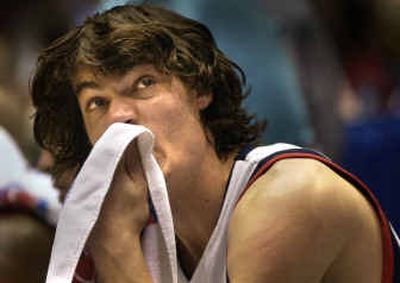The road stops here

TUCSON, Ariz. – John Rupp sits alone on the balcony at Gentle Ben’s pub Saturday morning drinking a Bloody Mary and gazing into the rain. His crutch leans against the wall beside him. He’s a member of Gonzaga University’s Kennel Club, one of only a handful of students to find their way here.
For Rupp, the $500 plane ticket for a solitary flight down to Tucson was money well spent. It’s his senior year. The civil engineering major hopes to work for the FBI after he graduates. Next week, three large tests loom.
“It’s a once-in-a-lifetime opportunity to come as a senior, and I figured I’d splurge,” Rupp says. So what if he fractured his femur playing intramural basketball several weeks ago. He’s down to only one crutch now.
Saturday begins with a Northwest-style rain, here in the Sonoran Desert, where Becky Nappi and I pursued our ZagQuest adventure this week. The raindrops seem not a dire omen at all, but a welcome splash of home.
We file into McKale Center. The Gonzaga men’s basketball team quickly energizes its fans. Even the older ones with deep pockets leap to their feet. The pep band, wearing red and blue wigs and painted faces, yells valiantly to make up for the missing Kennel Club.
As we clap and cheer, “Go G-U, Go G-U,” Becky, the Zag novice, turns to me.
“I just in this moment got what it means to be a fan,” she says. “It’s a full body experience.”
At halftime, the band members exult. We’re up by nine points. Paul Belknap, a baritone sax player from Ashland, Wis., says, “I feel their pain when they lose, and I’m pumped up when they win.”
Psychologist Lynn Kahle, a professor at the University of Oregon, says live sports provide real drama in real time. “We escape from the monotony of daily life by expressing what we know is excessive enthusiasm,” Kahle said. “It transfers us from one reality to another, perhaps more interesting reality.”
The game ends. The Zags lose by two points. It’s a heartbreaking reality; tears stream down a cheerleader’s face. The band plays GU’s fight song with sad eyes.
Outside the team’s locker room, a pall hangs. Father Robert Spitzer stands with his head bowed, his hands folded in front of him, the timeless stance of the priest giving the mourning family a few moments alone.
Soon Coach Mark Few, his eyes rimmed red, walks out in a solemn procession down the hall with Ronny Turiaf, biting one of his braids, and Adam Morrison, his head draped in a towel.
The three men speak at a press conference. There, a reporter asks about Turiaf’s emotions.
“I feel awful,” the graduating senior says. “That’s why we work so hard in the summertime and why we practice so hard during the year. That’s what we live for – to play in the NCAA tournament.”
He looks the reporter in the eye as his voice rasps, “You must know how I feel right now.”
Out in the arena, John Rupp slumps over a railing, stunned.
Those three tests bear down on him now, in tough courses like hydrology and water resource engineering. “It’s back to the grindstone,” he says. “The real world.”
Now that world beckons for Becky and me, too. We are startled how quickly we shift gears. Coach Few articulated it best: “It’s amazing how abruptly it ends. It’s been a heck of a lot of fun.”
Becky says, “In the end, it wasn’t Wake Forest that got them, after all. At 50, I’m realizing it’s rarely that which you fear that does you in.”
As I leave McKale Center, I walk back under the palm trees marking the main boulevard through the University of Arizona campus, thinking of how Gonzaga basketball brings my family and friends together. We live in a city where people work hard, value discipline and achievement, but most of all, one another.
As I reach a cactus garden at the center of campus, I pause. I search for the mysterious boojum tree, an improbable species from Baja that resembles an upside down turnip, its fat trunk narrowing into one long spike. At last I find it.
Named for a character in a poem by Lewis Carroll, the author of “Alice in Wonderland,” these trees resemble the dreams of devoted Zags fans, too fantastical to be real.
But they are.